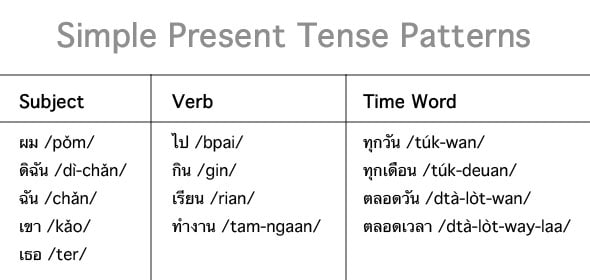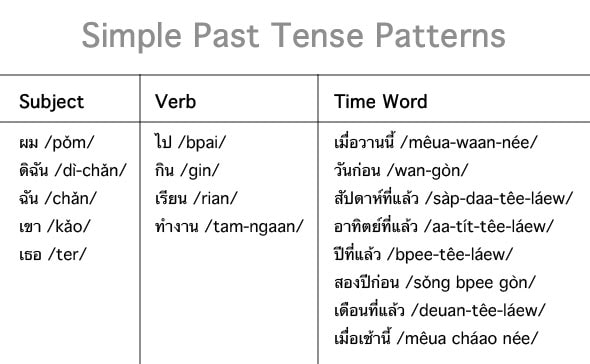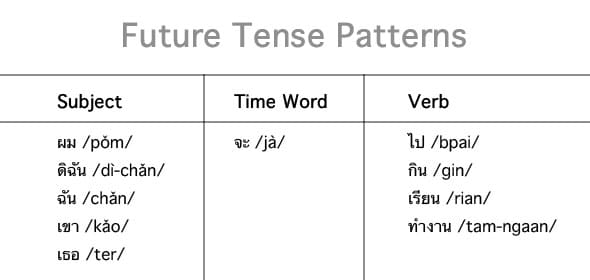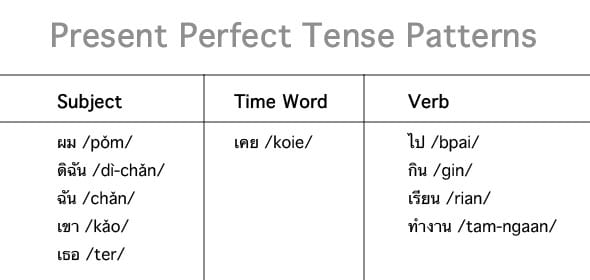Written By: Hugh Leong
With Thai language tense, there is some good news, and some really good news.
Enter your email below to receive our FREE Thai Language Cheat Sheet. It includes a comprehensive list of downloadable PDFs to quickly get you started learning the Thai language. The Cheat Sheet covers everything, from the alphabet, tone marks, and consonant sounds to vocabulary and much more.
Contents
The good news
Unlike English verbs, and verbs from all Romance languages as well as so many other languages around the world, Thai verbs don’t change with the person. There is no “I go”, “You go” “He goes”. It is all just “go”. You’ll never have to learn a Thai verb conjugation.
The really good news
Thai is a tenseless language. You will never have to learn different endings for Thai verbs for person, or for present, past, and future tenses.
And there are no such things as irregular Thai verbs. You’ll have to learn a few Thai words that will help with time stamps, and some simple time words like today, yesterday, and tomorrow, that will help us know when an action is taking place, but compared to conjugations, they’re a piece of cake.
Who said Thai was difficult?
We will be giving examples of verbs in sentences by using a list of frequently used verbs. An old colleague of mine, Professor Steve Tripp of the University of Aizu in Japan, has done some interesting computer based language analysis. He used an algorithm to parse the Internet and came up with an English verb frequency list. It is a huge list but we’ll use only some of the most used verbs for our examples.
Here is a list of our verbs and their Thai equivalents. When there are synonyms in Thai we’ll give them too.
go: ไป /bpai/
do: ทำ /tam/
think: คิด /kít/ (ว่า /wâa/, ถึง /tĕung/), นึก /néuk/ (ว่า /wâa/, ถึง /tĕung/)
get: ได้ /dâai/ ได้รับ /dâai ráp/, เอา /ao/
know: ทราบ /sâap/
be: เป็น /bpen/, อยู่ /yòo/, คือ /keu/
want: ต้องการ /dtông gaan/, อยาก /yàak/
look: ดู /doo/
come: มา /maa/
try: ลอง /long/, พยายาม /pá-yaa-yaam/
say พูด,ว่า pôot , wâa
make: ทำ /tam/, สร้าง /sâang/
would: คงจะ /kong jà/
see: ดู /doo/
work: งาน /ngaan/
have: มี /mee/
could: ได้ /dâai/
talk: พูด /pôot/, คุย /kui/
eat: กิน /gin/, ทาน /taan/
study: เรียน /rian/
play: เล่น /lên/
read: อ่าน /àan/
Examples of some “really good news”
If you only read this section you’ll have Thai verbs down. We’ll use the verb at the top of our frequency list “to go” – ไป / bpai /
I go – ฉัน ไป /chăn bpai/
He goes – เขา ไป /kăo bpai/
We go – เรา ไป /rao bpai/
She goes – เธอ ไป /ter bpai/
And (context or “time words” will tell us the tense).
I go – ฉัน ไป /chăn bpai/
I went – ฉัน ไป /chăn bpai/
I will go – ฉัน ไป /chăn bpai/
I am going – ฉัน ไป /chăn bpai/
Okay, there is a little more to it, but in fact, the above are all correct and would be understood depending on the context in which they were spoken.
Simple Present Tense

Some time-words for simple present tense
usually: ตามปรกติ /dtaam bpròk-gà-dtì/
often: บ่อย /bòi/, บ่อยครั้ง /bòr-yá-kráng/
never: ไม่เคย /mâi koie/
sometimes: บางครั้ง /baang kráng/
every day: ทุกวัน /túk wan/
every year: ทุกปี /túk bpee/
(in the) winter: (ช่วง) ฤดูหนาว /(chûang) réu-doo năao/
currently: ขณะนี้ /kà-nà née/
on the weekends: วันหยุดสุดสัปดาห์ /wan yùt sùt sàp-daa/
in the evening: ตอนเย็น /dton-yen/
in the morning: ตอนเช้า /dton-cháo/
in the afternoon: ตอนบ่าย /dton-bàai/
at night: ตอนกลางคืน /dtor nók laang keun/
now: ตอนนี้ /dton-née/
Verbs used in these examples:
be: เป็น /bpen/, อยู่ /yòo/
do: ทำ /tam/
think: คิด /kít/ (ว่า /wâa/, ถึง /tĕung/), นึก /néuk/ (ว่า /wâa/, ถึง /tĕung/)
get: ได้ /dâai/, เอา /ao/
เป็น /bpen/ – to be (+ a noun, a thing):
He’s American.
เขา เป็น ชาว อเมริกัน
kăo bpen chaao a-may-rí-gan
She is a teacher.
เธอ เป็น ครู
ter bpen kroo
I am a volunteer at the school in the afternoon.
ตอนบ่าย ผม เป็น อาสาสมัคร ที่ โรงเรียน
dton-bàai pŏm bpen aa-săa sà-màk têe rohng rian
The boys are football players.
ผู้ชาย เป็น นักฟุตบอล
pôo chaai bpen nák fút-bon
อยู่ /yòo/ – to be (at, in, a place, position):
We are at home every day.
เรา อยู่ ที่ บ้าน ทุกวัน
rao yòo têe bâan túk wan
He is in 6th grade.
เขา อยู่ ชั้น 6
kăo yòo chán hòk
Preecha is in the restaurant now.
ตอนนี้ ปรีชา อยู่ ใน ร้านอาหาร
dton-née bpree-chaa yòo nai ráan aa-hăan
In the morning his daughter is at the office.
ตอนเช้า ลูก สาว อยู่ ที่ทำงาน
dton-cháo lôok săa yòo têe tam gaan
ทำ /tam/ – to do:
He’s does homework in the evening.
เขา ทำ การบ้าน ตอนเย็น
kăo tam gaan bâan dton-yen
She does artwork.
เธอ ทำ ศิลปะ
ter tam sĭn-lá-bpà
We do gardening on the weekends.
เรา ทำ สวน วัน สุดสัปดาห์
rao tam sŭan wan sùt sàp-daa
They currently do office work (work in an office).
ขณะนี้ พวกเขา ทำ งาน ออฟฟิศ
kà-nà née pûak kăo tam ngaan óf-fít
คิด /kít/ (ว่า /wâa/, ถึง /tĕung/), นึก /néuk/ (ว่า /wâa/, ถึง /tĕung/) – to think, to think about:
I think he is handsome.
ฉัน คิดว่า เขา หล่อ
chăn kít wâa kăo lòr
She thinks about a new iPhone often.
เธอ นึกถึง iPhone ใหม่ บ่อย
ter néuk tĕung iPhone mài bòi
Every day He thinks about his guitar.
ทุกวัน เขา คิดถึง กีตาร์ ของ เขา
túk wan kăo kít tĕung gee-dtâa kŏng kăo
We think the new song is difficult.
เรา คิดว่า เพลง ใหม่ ยาก
rao kít wâa playng mài yâak
ได้ /dâai/, ได้รับ /dâai ráp/, เอา /ao/ – to get:
He gets good grades every year.
เขา ได้ เกรด ดี ทุกปี
kăo dâai gràyt dee túk bpee
The children get flu shots in the winter.
เด็ก ๆ ได้ ยาฉีด ป้องกัน ไข้หวัดใหญ่ ช่วง ฤดูหนาว
dèk dèk dâai yaa chèet bpông gan kâi wàt yài chûang réu-doo năao
My teacher gets fried rice every day.
ครู เอา ข้าวผัด ทุกวัน
kroo ao kâao pàt túk wan
She frequently gets a new iPhone.
เธอ ได้ iPhone ใหม่ บ่อยครั้ง
ter dâai iPhone mài bòie-kráng
Past Tense
(These may include what in English we call present and past perfect tenses.)

The use of the words ได้ and ยัง for negative past.
There is a special past-tense-helper in the Thai word ได้, especially used with negative sentences. The pattern is (person + ไม่ ได้ + verb).
I didn’t go.
ฉัน ไม่ ได้ ไป
chăn mâi dâai bpai
She didn’t eat.
เธอ ไม่ ได้ กิน
ter mâi dâai gin
We didn’t see the movie.
เรา ไม่ ได้ ดู หนัง
rao mâi dâai doo năng
We can also add the concept of “not yet” by using the word ยัง. The pattern is (person + ยัง ไม่ ได้ + verb).
I didn’t go yet.
ฉัน ยัง ไม่ ได้ ไป
chăn yang mâi dâai bpai
She didn’t eat yet.
เธอ ยัง ไม่ ได้ กิน
ter yang mâi dâai gin
We didn’t see the movie yet.
เรา ยัง ไม่ ได้ ดู หนัง
rao yang mâi dâai doo năng
Since Thai verbs don’t change when used in the past tense, we know we are speaking of the past in two ways. One) from context, and Two) From the use of a “past-word”. Since context can sometimes lead to misunderstandings it is best for us learners of Thai to use some “past-words” so that we can be more accurate and better understood.
Some time-words for past tense:
yesterday: เมื่อวานนี้ /mêua waan née/
last week: อาทิตย์ที่แล้ว /aa-tít têe láew/
last year: ปีที่แล้ว /bpee têe láew/
last month: เดือนที่แล้ว /deuan têe láew/
day before yesterday: เมื่อวานซืนนี้ /mêua waan-seun née/
this morning: เมื่อเช้านี้ /mêua cháo née/
in the evening: ตอนเย็น /dton-yen/
last night: เมื่อคืน /mêua keun/
in former times: สมัยก่อน /sà-măi gòn/, ในอดีต /nai a-dèet/
when …: เมื่อ … /mêua …/
before: ก่อน /gòn /
after: หลังจาก /lăng jàak /
used to: เคย /koie/
already: แล้ว /láew/
Verbs used in these examples:
try: ลอง /long/, พยายาม /pá-yaa-yaam/
say: พูด /pôot/, ว่า /wâa/, บอกว่า /bòk wâa/
make: ทำ /tam/, สร้าง /sâang/
eat: กิน /gin/, ทาน /taan/
study: เรียน /rian/
play: เล่น /lên/
read: อ่าน /àan/
Note: Download the pdf to see the underlined time-words.
Aree wanted a puppy when she was a girl.
อารีย์ ต้องการ (อยาก ได้) ลูก สุนัข (ลูก หมา) เมื่อ เธอ เป็น สาว
aa-ree dtông gaan (yàak dâai) lôok sù-nák (lôok măa) mêua ter bpen săao
We looked at the sunset yesterday (in the) afternoon.
เรา ดู พระอาทิตย์ ตก เมื่อวานนี้ ตอนบ่าย
rao doo prá aa-tít dtòk mêua waan née dton-bàai
Manee and Lek came (returned) late last night.
มณี และ เล็ก มา (กลับ มา) ดึก เมื่อคืน
má-nee láe lék maa (glàp maa) dèuk mêua keun
The students tried the new noodle shop after school (ended).
นักเรียน ลอง ร้าน ก๋วยเตี๋ยว ใหม่ หลังจาก เลิก เรียน
nák rian long ráan gŭay-dtĭeow mài lăng jàak lêrk rian
This morning she said she wanted fried eggs for breakfast.
เมื่อเช้านี้ เธอ บอกว่า เธอ อยาก ทาน ไข่ ทอด เป็น อาหาร เช้า
mêua cháo née ter bòk wâa ter yàak taan kài tôt bpen aa hăan cháo
In former times (in the past) the workers made (built) a wall around the city.
ในใสมัยก่อน (ในอดีต) คน งาน ทำ (สร้าง) กำแพง รอบ เมือง
nai săi mai gòn (nai a-dèet) kon ngaan tam (sâang) gam-paeng rôp meuang
We ate before we studied.
เรา กิน ก่อน เรา เรียน
rao gin gòn rao rian
She studied after she played video games.
เธอ เรียน หลังจาก เธอ เล่น วิดีโอเกม
ter rian lăng jàak ter lên wí-dee-oh gaym
The children used to play football in the evening.
เด็ก เคย เล่น ฟุตบอล ตอนเย็น
dèk koie lên fút bon dton-yen
I already read that book.
ผม ได้ อ่าน หนังสือ เล่ม นั้น แล้ว
pŏm dâai àan năng-sĕu lêm nán láew
Caveat: In the sentence เรา กิน ก่อน เรา เรียน /rao gin gòn rao rian/ (we translated it as “we ate before we studied”) the possibility of misunderstanding can arise.
The sentence เรา กิน ก่อน เรา เรียน /rao gin gòn rao rian/ could be translated as:
We ate before we studied.
We will eat before we study.
We eat (every day) before studying.
It a situation like this we may have to depend on the context in which we are speaking to know which one is correct. Yes, Thai verbs might be easier to navigate than English verbs but because they are less specific, sometimes misunderstandings can occur.
One way to deal with this problem is to add another time-word to clear things up.
We already ate before we studied.
เรา กิน แล้ว ก่อน เรา เรียน
rao gin láew gòn rao rian
We will eat before we study.
เรา จะ กิน ก่อน เรา เรียน
rao jà gin gòn rao rian
(The word จะ /jà/ is a future word we will get to below)
We eat every day before we study.
เรา กิน ทุกวัน ก่อน เรา เรียน
rao gin túk wan gòn rao rian
Future Tense

Some time-words for future tense:
The most important time-word for future in English is “will” and in Thai its equivalent is จะ /jà/. Almost all future sentences will contain the pattern จะ /jà/ + verb.
tomorrow: พรุ่งนี้ /prûng-née/
tomorrow morning: พรุ่งนี้เช้า /prûng-née cháo/
this afternoon: บ่ายนี้ /bàai née/
this evening: เย็นนี้ /yen née/
tonight: คืนนี้ /keun née/
next week: สัปดาห์หน้า /sàp-daa nâa/
next month: เดือนหน้า /deuan nâa/
next year: ปีหน้า /bpee nâa/
in two weeks: ในอีกสองสัปดาห์ /nai èek sŏng sàp-daa/
day after tomorrow: วันมะรืนนี้ /wan má-reun née/
Verbs used in these examples:
come: มา /maa/
eat: กิน /gin/, ทาน /taan/
study: เรียน /rian/
play: เล่น /lên/
be: เป็น /bpen/, อยู่ /yòo/
do: ทำ /tam/
get: ได้ /dâai/, เอา /ao/
try: ลอง /long/, พยายาม /pá-yaa-yaam/
make: ทำ /tam/, สร้าง /sâang/
Again, to see the underlined time-words, download the pdf.
Our relatives are coming tomorrow.
ญาติ ของ เรา จะ มา พรุ่งนี้
yâat kŏng rao jà maa prûng-née
Tomorrow morning she will eat eggs and toast.
พรุ่งนี้เช้า เธอ จะ กิน ไข่ และ ขนมปังปิ้ง
prûng-née cháo ter jà gin kài láe kà-nŏm bpang bpîng
I am studying English this afternoon.
บ่ายนี้ ฉัน จะ เรียน ภาษาอังกฤษ
bàai née chăn jà rian paa-săa ang-grìt
They are going to play football this evening.
เย็นนี้ พวกเขา จะ เล่น ฟุตบอล
yen née pûak kăo jà lên fút bon
She wants to be a doctor.
เธอ อยาก จะ เป็น หมอ
ter yàak jà bpen mŏr
The day after tomorrow she will be in Bangkok.
วันมะรืนนี้ เธอ จะ อยู่ กรุงเทพฯ
wan má-reun née ter jà yòo grung tâyp
Sunee will do her homework tonight.
สุนีย์ จะ ทำ การบ้าน คืนนี้
sù-nee jà tam gaan bâan keun née
Next week Somchai is getting a new motorcycle.
สัปดาห์หน้า สมชาย จะ ได้ รถจักรยานยนต์ ใหม่
sàp-daa nâa sŏm-chaai jà dâai rót jàk-grà-yaan yon mài
I’ll try to visit you next month.
เดือนหน้า ฉัน จะ พยายาม เยี่ยม คุณ
deuan nâa chăn jà pá-yaa-yaam yîam kun
I won’t make a mistake.
ฉัน จะ ไม่ ทำผิด
chăn jà mâi tam pìt
Present continuous tense
The present continuous tense in English is one way we can say what is happening “now”. To create this tense in Thai we use the pattern กำลัง /gam-lang/ + verb.
Now:
He is working at the factory.
เขา กำลัง ทำงาน ที่ โรงงาน
kăo gam-lang tam ngaan têe rohng ngaan
She is studying English.
เธอ กำลัง เรียน ภาษา อังกฤษ
ter gam-lang rian paa-săa ang-grìt
They are playing video games.
พวกเขา กำลัง เล่น วิดีโอเกม
pûak kăo gam-lang lên wí-dee-oh gaym
If we add the word อยู่ to the pattern, giving us กำลัง + verb + อยู่ it adds the concept “right now”, “at this moment”.
Right Now:
Manit is eating dinner (right now).
มานิต กำลัง ทาน อาหารเย็น อยู่
maa-nít gam-lang taan aa-hăan yen yòo
Sunee is practicing piano (at this moment).
สุนีย์ กำลัง เล่น เปียโน อยู่
sù-nee gam-lang lên bpia noh yòo
I am working on the computer (right now).
ฉัน กำลัง ทำงาน คอมพิวเตอร์ อยู่
chăn gam-lang tam ngaan kom-piw-dtêr yòo
Future using กำลัง /gam-lang/:
As with the present continuous tense in English the same pattern can indicate a future time (“I’m going now”, “I’m going tomorrow”). To do this in Thai we need add the future word จะ /jà/. The pattern is กำลัง /gam-lang/+ จะ /jà/ + verb.
The girls are going to come tomorrow.
สาว ๆ กำลัง จะ มา พรุ่งนี้
săao săao gam-lang jà maa prûng-née
The policeman is going to get a new car next month.
ตำรวจ กำลัง จะ ได้ รถ ใหม่ เดือนหน้า
dtam-rùat gam-lang jà dâai rót mài deuan nâa
The students are going to (go to) school this morning.
นักเรียน กำลัง จะ ไป โรงเรียน เช้านี้
nák rian gam-lang jà bpai rohng rian cháo née
Present Perfect Tense

Sentence pattern: Subject + เคย + verb
Time word: เคย /koie/
Possible combinations:
ผม เคย เรียน…
pǒm koie rian…
I have studied… / I used to study…
เขา เคย ไป…
kǎo koie bpai…
He’s gone… / He used to go…
เธอ เคย ทำงาน
ter koie tam-ngaan
She has worked… / She used to work…
Vocabulary used in the chapter
กลับ /glàp/ to return
กำแพง /gam-paeng/ wall
กีตาร์ /gee-dtâa/ guitar
เกรด /gràyt/ grade (English loan word)
ขนมปังปิ้ง /kà-nŏm bpang bpîng/ toast
ไข้หวัดใหญ่ /kâi wàt yài/ flu
ครู /kroo / teacher
คอมพิวเตอร์ /kom-piw-dtêr/ computer (English loan word)
ชั้น /chán/ level (school grade)
ชาว /chaao/ person of
ญาติ /yâat/ family relation
ดู หนัง /doo năng/ to go to (see) a movie
ทำผิด /tam pìt/ to make a mistake
ที่ทำงาน /têe tam gaan/ place of work, office
ป้องกัน /bpông gan/ protect (from)
พระอาทิตย์ตก /prá aa-tít dtòk/ sunset
เพลง /playng/ song
เมือง /meuang/ city, town
ยาก /yâak/ difficult
ยาฉีด /yaa chèet/ injection, inoculation
เยี่ยม /yîam/ to visit
รถจักรยานยนต์ /rót jàk-grà-yaan yon/ motorcycle
รอบ /rôp/ around
ร้าน ก๋วยเตี๋ยว /ráan gŭay-dtĭeow/ noodle shop
โรงงาน /rohng ngaan/ factory
ลูก สุนัข (ลูก หมา) /lôok sù-nák (lôok măa) puppy
ศิลปะ /sĭn-lá-bpà art/ art
สวน /sŭan/ garden
หมอ /mŏr / doctor
หล่อ /lòr/ handsome
ออฟฟิศ /óf-fít/ office (English loan word)
อาสาสมัคร /aa-săa sà-màk/ volunteer
Examples of verbs in sentences…
เขา เป็น ชาว อเมริกัน
kăo bpen chaao a-may-rí-gan
เธอ เป็น ครู
ter bpen kroo
ตอนบ่าย ผม เป็น อาสาสมัคร ที่ โรงเรียน
dton-bàai pŏm bpen aa-săa sà-màk têe rohng rian
ผู้ชาย เป็น นักฟุตบอล
pôo chaai bpen nák fút-bon
เรา อยู่ ที่ บ้าน ทุกวัน
rao yòo têe bâan túk wan
เขา อยู่ ชั้น 6
kăo yòo chán hòk
ตอนนี้ ปรีชา อยู่ ใน ร้านอาหาร
dton-née bpree-chaa yòo nai ráan aa-hăan
ตอนเช้า ลูก สาว อยู่ ที่ทำงาน
dton-cháo lôok săa yòo têe tam gaan
เขา ทำ การบ้าน ตอนเย็น
kăo tam gaan bâan dton-yen
เธอ ทำ ศิลปะ
ter tam sĭn-lá-bpà
เรา ทำ สวน วัน สุดสัปดาห์
rao tam sŭan wan sùt sàp-daa
ขณะนี้ พวกเขา ทำ งาน ออฟฟิศ
kà-nà née pûak kăo tam ngaan óf-fít
ฉัน คิดว่า เขา หล่อ
chăn kít wâa kăo lòr
เธอ นึกถึง iPhone ใหม่ บ่อย
ter néuk tĕung iPhone mài bòi
ทุกวัน เขา คิดถึง กีตาร์ ของ เขา
túk wan kăo kít tĕung gee-dtâa kŏng kăo
เรา คิดว่า เพลง ใหม่ ยาก
rao kít wâa playng mài yâak
เขา ได้ เกรด ดี ทุกปี
kăo dâai gràyt dee túk bpee
เด็ก ๆ ได้ ยาฉีด ป้องกัน ไข้หวัดใหญ่ ช่วง ฤดูหนาว
dèk dèk dâai yaa chèet bpông gan kâi wàt yài chûang réu-doo năao
ครู เอา ข้าวผัด ทุกวัน
kroo ao kâao pàt túk wan
เธอ ได้ iPhone ใหม่ บ่อยครั้ง
ter dâai iPhone mài bòr-yá-kráng
ฉัน ไม่ ได้ ไป
chăn mâi dâai bpai
เธอ ไม่ ได้ กิน
ter mâi dâai gin
เรา ไม่ ได้ ดู หนัง
rao mâi dâai doo năng
ฉัน ยัง ไม่ ได้ ไป
chăn yang mâi dâai bpai
เธอ ยัง ไม่ ได้ กิน
ter yang mâi dâai gin
เรา ยัง ไม่ ได้ ดู หนัง
rao yang mâi dâai doo năng
อารีย์ ต้องการ (อยาก ได้) ลูก สุนัข (ลูก หมา) เมื่อ เธอ เป็น สาว
aa-ree dtông gaan (yàak dâai) lôok sù-nák (lôok măa) mêua ter bpen săao
เรา ดู พระอาทิตย์ ตก เมื่อวานนี้ ตอนบ่าย
rao doo prá aa-tít dtòk mêua waan née dton-bàai
มณี และ เล็ก มา (กลับ มา) ดึก เมื่อคืน
má-nee láe lék maa (glàp maa) dèuk mêua keun
นักเรียน ลอง ร้าน ก๋วยเตี๋ยว ใหม่ หลังจาก เลิก เรียน
nák rian long ráan gŭay-dtĭeow mài lăng jàak lêrk rian
เมื่อเช้านี้ เธอ บอกว่า เธอ อยาก ทาน ไข่ ทอด เป็น อาหาร เช้า
mêua cháo née ter bòk wâa ter yàak taan kài tôt bpen aa hăan cháo
ในใสมัยก่อน (ในอดีต) คน งาน ทำ (สร้าง) กำแพง รอบ เมือง
nai săi mai gòn (nai a-dèet) kon ngaan tam (sâang) gam-paeng rôp meuang
เรา กิน ก่อน เรา เรียน
rao gin gòn rao rian
เธอ เรียน หลังจาก เธอ เล่น วิดีโอเกม
ter rian lăng jàak ter lên wí-dee-oh gaym
เด็ก เคย เล่น ฟุตบอล ตอนเย็น
dèk koie lên fút bon dton-yen
ผม ได้ อ่าน หนังสือ เล่ม นั้น แล้ว
pŏm dâai àan năng-sĕu lêm nán láew
เรา กิน แล้ว ก่อน เรา เรียน
rao gin láew gòn rao rian
เรา จะ กิน ก่อน เรา เรียน
rao jà gin gòn rao rian
เรา กิน ทุกวัน ก่อน เรา เรียน
rao gin túk wan gòn rao rian
ญาติ ของ เรา จะ มา พรุ่งนี้
yâat kŏng rao jà maa prûng-née
พรุ่งนี้เช้า เธอ จะ กิน ไข่ และ ขนมปังปิ้ง
prûng-née cháo ter jà gin kài láe kà-nŏm bpang bpîng
บ่ายนี้ ฉัน จะ เรียน ภาษาอังกฤษ
bàai née chăn jà rian paa-săa ang-grìt
เย็นนี้ พวกเขา จะ เล่น ฟุตบอล
yen née pûak kăo jà lên fút bon
เธอ อยาก จะ เป็น หมอ
ter yàak jà bpen mŏr
วันมะรืนนี้ เธอ จะ อยู่ กรุงเทพฯ
wan má-reun née ter jà yòo grung tâyp
สุนีย์ จะ ทำ การบ้าน คืนนี้
sù-nee jà tam gaan bâan keun née
สัปดาห์หน้า สมชาย จะ ได้ รถจักรยานยนต์ ใหม่
sàp-daa nâa sŏm-chaai jà dâai rót jàk-grà-yaan yon mài
เดือนหน้า ฉัน จะ พยายาม เยี่ยม คุณ
deuan nâa chăn jà pá-yaa-yaam yîam kun
ฉัน จะ ไม่ ทำผิด
chăn jà mâi tam pìt
เขา กำลัง ทำงาน ที่ โรงงาน
kăo gam-lang tam ngaan têe rohng ngaan
เธอ กำลัง เรียน ภาษา อังกฤษ
ter gam-lang rian paa-săa ang-grìt
พวกเขา กำลัง เล่น วิดีโอเกม
pûak kăo gam-lang lên wí-dee-oh gaym
มานิต กำลัง ทาน อาหารเย็น อยู่
maa-nít gam-lang taan aa-hăan yen yòo
สุนีย์ กำลัง เล่น เปียโน อยู่
sù-nee gam-lang lên bpia noh yòo
ฉัน กำลัง ทำงาน คอมพิวเตอร์ อยู่
chăn gam-lang tam ngaan kom-piw-dtêr yòo
สาว ๆ กำลัง จะ มา พรุ่งนี้
săao săao gam-lang jà maa prûng-née
ตำรวจ กำลัง จะ ได้ รถ ใหม่ เดือนหน้า
dtam-rùat gam-lang jà dâai rót mài deuan nâa
นักเรียน กำลัง จะ ไป โรงเรียน เช้านี้
nák rian gam-lang jà bpai rohng rian cháo née
